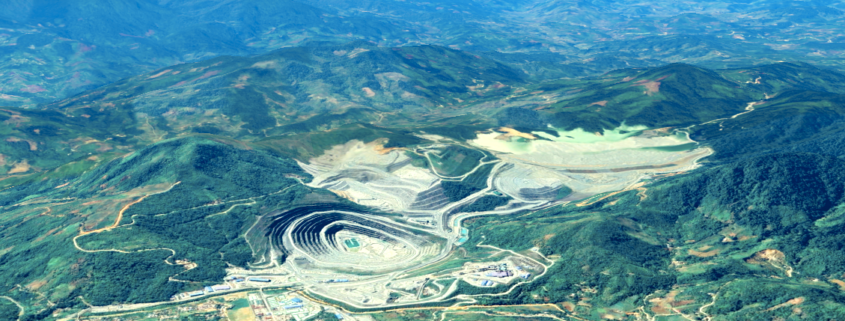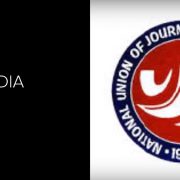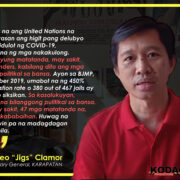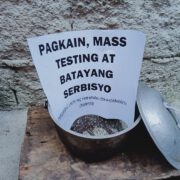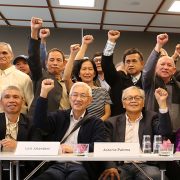Duterte’s new mining order disastrous to environment—groups
President Rodrigo Duterte lifted the nine-year moratorium on new mineral agreements, earning warnings from various groups of further corporate plunder of the environment and more natural disasters.
Bayan Muna Representative Eufemia Cullamat said she is dismayed with Duterte’s decision that would most likely result in the worsening of the environmental crisis in the country.
“Instead of putting a stop to environmental destruction that causes disasters, he is allowing further exploitation of our natural resources,” Cullamat said.
Cullamat, a Manobo Lumad persecuted for her community’s opposition to further mining activities in their ancestral domain, said mining projects have only brought untold suffering to various indigenous communities around the country.
“The country only earns two percent in royalty taxes in exchange for the tons of soil they extract, the poisoning of our waterways by mine tailings and the loss of livelihood and homes in mining sites,” she said.
In his Executive Order (EO) 130 issued Wednesday, April 14, Duterte amended former President Benigno Aquino’s EO 79, granting permission to the government to enter into new mineral agreements.
“The Government may enter into new mineral agreements, subject to compliance with the Philippine Mining Act of 1995 and other applicable laws, rules and regulations,” Duterte’s order said.
“The DENR (Department of Environment and Natural Resources) may continue to grant and issue Exploration Permits,” it added.
Duterte’s order said new mineral agreements will usher significant economic benefits to the country that can support various government projects, such as the Build Build Build and Balik Probinsiya, Bagong Pag-Asa Program by providing raw materials and new employment opportunities.
‘Unfettered corporate greed’
Environmental group Kalikasan People’s Network for the Environment (Kalikasan PNE) however agreed with Cullamat, adding Duterte’s order will only result in more environmental disasters.
“Mr. Duterte’s order to lift the mining agreement moratorium will be a disaster upon disaster because the Mining Act of 1995 is still in place. We cannot allow this deluge of destructive large-scale mining when communities are still suffering from the converging pandemic and climate crises,” Kalikasan PNE national coordinator Leon Dulce said.
The Mining Act encourages 100% ownership of mineral lands by foreign corporations that operate based on “unfettered corporate greed” and does not orient the mining industry to extract based on people’s needs, he added.
Kalikasan PNE said the law also has provisions that allow companies to renege on rehabilitation, polluter taxation and waste management obligations.
“Mining companies need only to pay P50.00 per ton of waste disposed of in unauthorized areas and only P0.05 for every ton of mine waste and P0.10 for mine tailings in terms of compensation for resulting damages,” the group explained.
“Let us recall that in the industry-wide audit made by the late Environment Secretary Regina Lopez, at least 68 percent of mining companies had been found with serious violations. This revelation already spells the potential disaster that the Executive Order will bring to the environment and communities,” Kalikasan added.
Beneficial to foreign corporations
Economic think-tank IBON said that Duterte’s new order will most likely benefit foreigners, not the local industry.
“Without domestic industries to process and use the minerals, [EO 130] will just mean that the most significant value-added from our finite mineral resources will keep going to foreign firms, industries and economies,” IBON executive director Sonny Africa said.
Africa said that at the expense of even more environmental damage and displacement of rural communities, real economic gains from Duterte’s decision are negligible.
“Even before the pandemic, mining and quarrying only employed around 190,000 in 2019. That’s not even half a percentage point of total employment and the 2-week NCR+ ECQ even displaced more jobs than that,” Africa said.
Similarly, the Php15.5 billion in taxes, mining fees and royalties paid to government in 2019 is negligible even with the additional excise tax under the TRAIN (Tax Reform for Acceleration and Inclusion, Republic Act No. 10963) law,” the economist explained.
“This EO No. 130 is just the latest sign that it really is just business as usual for the economic managers. The refusal to really reform economic policies combined with the pandemic will just mean that people will remain worse off than before the pandemic for many years to come,” Africa said. # (Raymund B. Villanueva)

